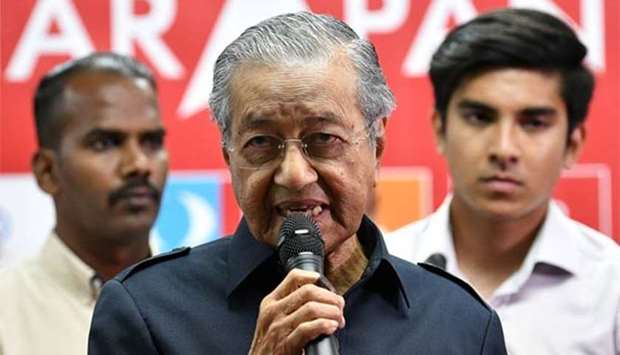Malaysian Prime Minister Mahathir Mohamad said on Monday he was scrapping a project to build a high-speed railway to Singapore, in an ominous sign for the neighbours' famously fractious relationship.
Mahathir, who won a surprise election victory this month against Najib Razak's long-ruling coalition, is seeking to repair the country's finances, which he says deteriorated dramatically after the former government became embroiled in a huge financial scandal.The leader said it was a "final decision" to scrap plans for the bullet-train line between Kuala Lumpur and Singapore, which had been agreed on several years ago and was expected to cut travel times to 90 minutes from five hours by road today.
"It's not beneficial. It's going to cost us a huge sum of money, we'll make no money at all from this operation," the 92-year-old said.
Mahathir said he was not sure how long his decision would take to implement, adding: "Of course we have to talk to Singapore, we have an agreement with them."
Asked if Singapore had been informed of his decision, he said: "I don't know."
Malaysia, he said, may have to pay as much as 500mn ringgit ($125.7mn) in compensation.
A Singapore transport ministry spokesman told AFP the government had "not yet received any official notification from Malaysia".
The development will alarm the Singapore government, which is watching to see whether the return of Mahathir -- whose relationship with the city-state was famously prickly during his first stint as premier from 1981-2003 -- might cause ties to worsen.
The neighbours have had a difficult relationship since Singapore was expelled from the Malaysian Federation in 1965 over ethnic issues, and relations in subsequent decades were punctuated by occasional bickering.
When Mahathir was first prime minister, rows erupted frequently over everything from water -- Singapore gets its water supply from Malaysia -- to the Malaysian leader's plan to build a bridge connecting the neighbours to replace the current causeway. The project never took off.
But under Najib, who was accused of overseeing the plunder of state coffers, relations had been warm.
Malaysia and Singapore signed a deal in 2016 to build the railway.
Companies had started submitting bids for the 350-kilometre line, which was scheduled to be completed by 2026.
Currently, most people take a flight of around an hour between Singapore and Kuala Lumpur, on what is the world's busiest international air route.
Chinese companies were seen as having a high chance of landing a chunk of the project as ties had warmed with Malaysia under Najib.
Others were also keen -- in February a powerful European consortium that included Alstom and Siemens announced it had partnered with a Malaysian firm to bid for the project. There was also expected to be interest from Japan.
No official assessment of the railway's cost has been made public but analyst estimates in 2016 were as high as $15bn.
Mahathir has said that Malaysia's debt had ballooned to more than one trillion ringgit ($251bn) under Najib, and he would review projects agreed under his predecessor.
In a weekend interview he said his government was renegotiating the terms of a Chinese-funded $14bn rail link traversing peninsular Malaysia.
Najib was ejected from power by voters disgusted at corruption allegations surrounding sovereign wealth fund 1MDB.
The ex-leader, his family and cronies are accused of stealing billions of dollars from the fund and using it to buy everything from high-end real estate to artworks.
Najib, who has been banned from leaving the country and questioned over the graft allegations since losing power, and 1MDB deny any wrongdoing.

